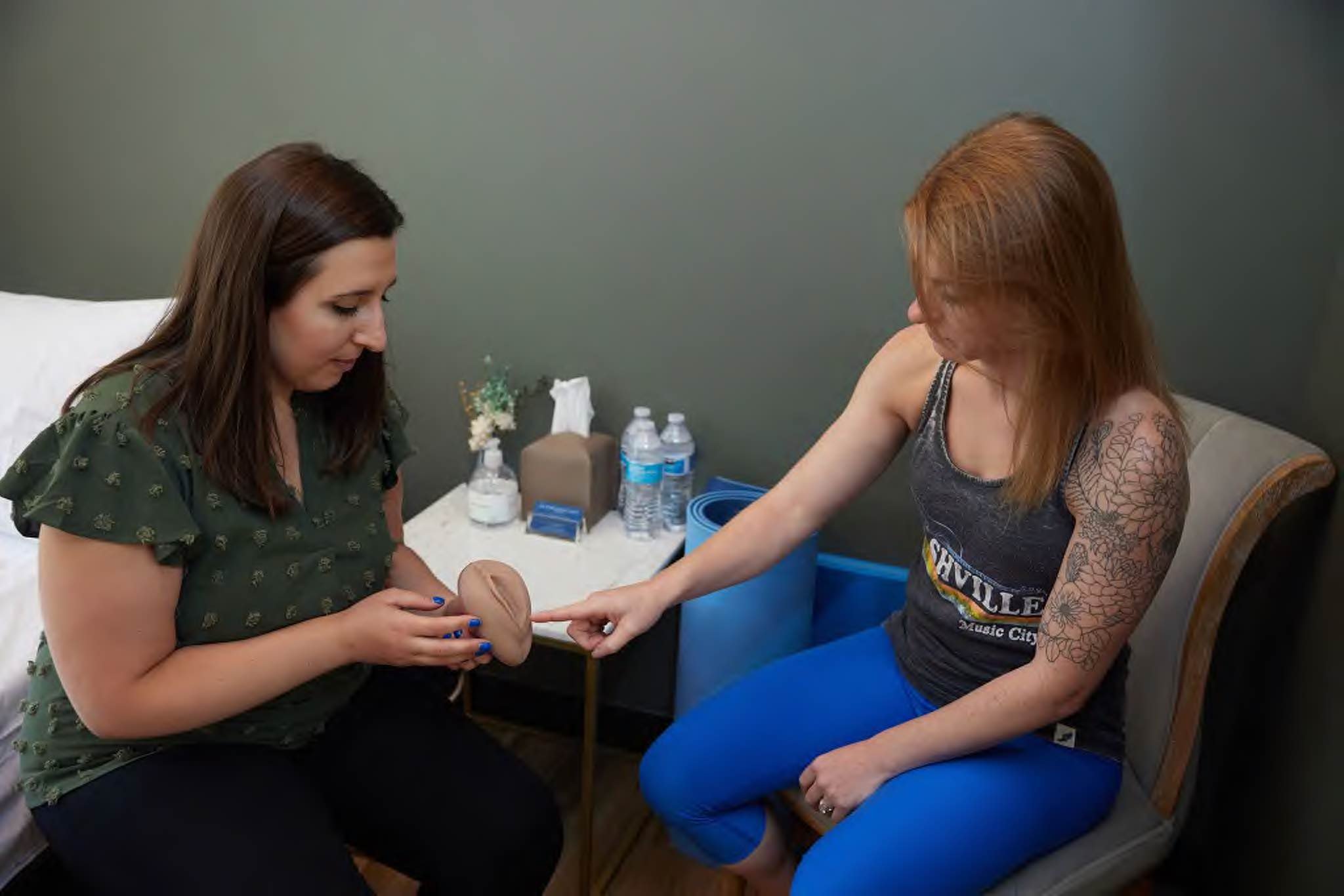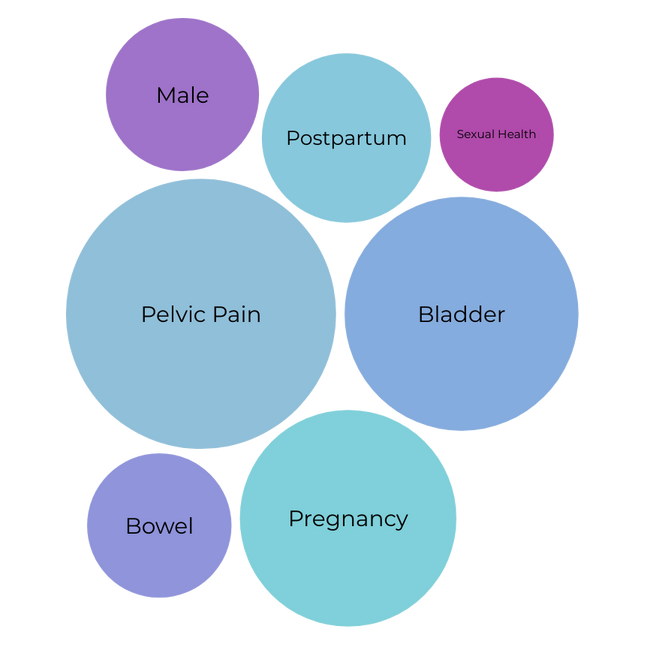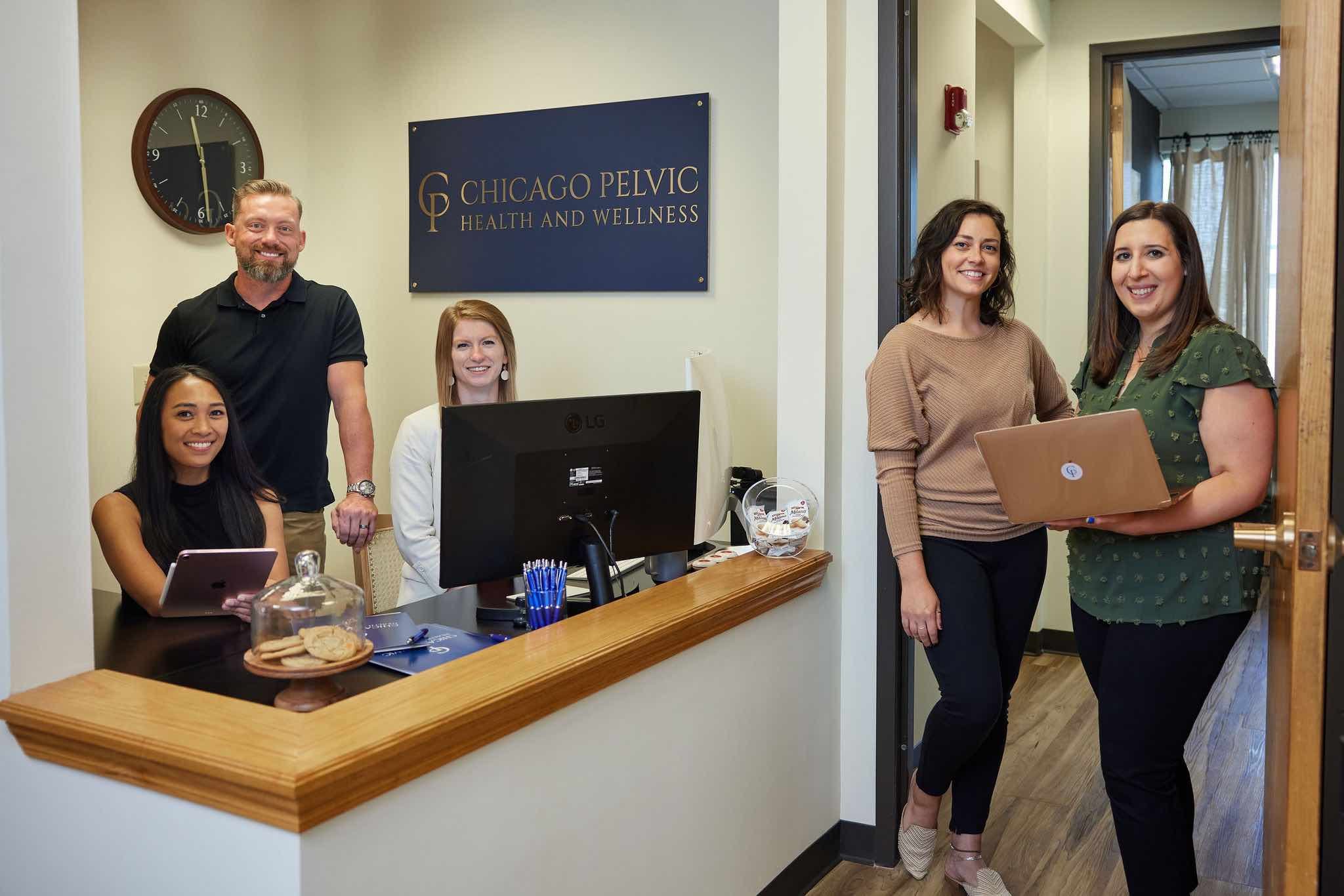
Pelvic Floor PT Experts in Wheaton
Specialized Care for Lasting Relief
Welcome to Chicago Pelvic Health and Wellness, the premier destination for expert pelvic floor physical therapy located in Wheaton, and treating patients from Glen Ellyn, Naperville, Lombard, Aurora and the remaining Western Chicago Suburbs. Our Board-Certified Doctors of Physical Therapy provide one-on-one, specialized care for people of all genders and ages. We treat a wide range of pelvic health concerns, including pregnancy and postpartum recovery, urinary incontinence, pelvic pain, pelvic organ prolapse, bowel issues, sexual health concerns, and more. Whether you live in Wheaton or the surrounding suburbs, we’re here to help you regain control of your pelvic health, reduce pain, and improve your overall quality of life.
Who does CPHW Treat?
Pelvic Floor PT is for everyone—men, women, and teens—treating bladder, bowel, pain, sexual health, pregnancy, postpartum, and more.
Percentage of Male and Female Patients being seen for Pelvic PT at CPHW
The Average Age of our Patients being treated for Pelvic Floor Dysfunction
The Most Common Pelvic Floor Concerns Treated in our Wheaton Office
Our mission at CPHW is to bring awareness to the challenging and complex pelvic health issues women and men face through our individualized care plans in our empathetic environment. We pride ourselves on delivering superior pelvic floor care with the utmost respect and professionalism. We are committed to empowering our patients to get back to the life they have been waiting to enjoy!
What makes Pelvic Floor Physical Therapy different at CPHW
One-on-One Care, Every Minute Focused on You
Our Wheaton pelvic floor therapy clinic offers private, 60-minute sessions with your dedicated Doctor of Physical Therapy. You will receive undivided attention in a comfortable treatment room with a pillow-top medical bed, soft pillows, and real sheets, all designed for your comfort while ensuring you get the most out of your time here.
Board-Certified Pelvic Health Experts
All of our therapists are board-certified in Pelvic Rehabilitation, with advanced training in treating complex pelvic floor conditions. From postpartum recovery to chronic pelvic pain, our expertise ensures you receive the highest level of evidence-based care.
Individualized Treatment Plans That Work
No cookie-cutter programs here. Your plan is built specifically for you, whether your goal is returning to exercise, reducing lower back pain, improving menopause health, or overcoming bladder or bowel dysfunction.
A Holistic Approach to Healing
Your pelvic floor is connected to your entire body, both physically and emotionally. We take a whole-body approach, considering posture, movement, breathing, and mental well-being for lasting results.
A Safe, Comfortable Environment
Located in Wheaton, IL and serving the surrounding suburbs, our clinic is warm and welcoming, not a cold medical office or noisy open gym. We prioritize privacy, comfort, and your peace of mind.
Leave with Hope and a Plan
At Chicago Pelvic Health, you will leave each visit with answers, a clear action plan, and the confidence to take control of your health. Our goal is to empower you with the tools and support you need to thrive.
CPHW is your go to medical center for pelvic health and wellness!
Expert Pelvic Floor PT (PFPT) for Men and Women of all ages:
PFPT is a specialized physical therapy focused on diagnosing and treating conditions related to the pelvic floor muscles. This includes personalized treatment plans and exercises designed to address issues related to your pelvic floor area. The goal is to improve the strength, flexibility, and function of the pelvic floor, leading to better overall health and quality of life. At CPHW, our expert pelvic floor PT is delivered by Board-Certified Doctors of Physical Therapy who are dedicated to providing the highest level of care.
We offer specialized care for:
Bladder Issues: Treating bladder frequency or urgency, urinary leakage/incontinence, bladder pain, difficulty starting or stopping, trouble emptying bladder, nocturia
Bowel Issues: Treating fecal leakage/incontinence, constipation, inability to control gas, bowel irregularities, irritable bowel syndrome, fecal urgency, incomplete evacuation, rectal prolapse
Pelvic Pain: Treating interstitial cystitis, genital pain, tailbone pain, groin & hip pain, pain with sex or exams, pelvic congestion, endometriosis, vulvodynia, vaginismus, pudendal neuralgia
Pregnancy & Postpartum: Treating pelvic girdle pain, pregnancy related pain, diastasis recti, returning to exercise, pelvic organ prolapse, low back/SI joint pain, birth preparation, scar adhesion, and Cesarean section (C-Section)
Male Pelvic Concerns: Addressing male pelvic pain, chronic prostatitis, pre- and post-operative care for prostatectomy, pain with sex, hip/lower back pain, groin pain, tailbone pain, and male diastasis recti
Sexual Health: Erectile dysfunction, premature ejaculation, difficulty with orgasm, pain or leakage associated with sex, pain with penetration, arousal disorders, menopause health, sexual assault care

Partnerships and Acknowledgments
We would like to thank the following local and national institutions that have helped build the pelvic health community and helped us become experts in Pelvic Floor Physical Therapy!
Board Certified Pelvic Health Specialist
Chicago Pelvic’s team of Doctors have been certified by multiple organizations, ensuring the highest level of expert Pelvic Floor medical care.
-
A DPT is a "Doctor of Physical Therapy." They are a healthcare professional who has completed a doctoral-level program in physical therapy and is licensed to practice physical therapy.
Pelvic Floor Physical Therapist are the true experts in musculoskeletal system.
DPT programs typically take three to four years to complete and include coursework in anatomy, physiology, pharmacology, kinesiology, exercise prescription, and other related topics. Students also gain clinical experience through internships and other practical training opportunities.
After completing a DPT program, graduates must pass a licensing exam to become a licensed Physical Therapist (PT).
-
WCS stands for "Women's Clinical Specialist." It is a board certification program offered by the American Board of Physical Therapy Specialties (ABPTS) that focuses on advanced knowledge and expertise in the physical therapy management of pelvic health conditions.
Physical therapists who obtain the WCS certification have completed advanced training in the evaluation and treatment of a range of health conditions, such as pelvic pain, urinary incontinence, pelvic organ prolapse, pregnancy and postpartum musculoskeletal conditions, and breast cancer-related rehabilitation.
The certification process includes a rigorous examination and demonstration of advanced clinical skills and knowledge, as well as ongoing continuing education requirements to maintain the certification. PTs with a WCS certification can provide specialized care to people throughout their lifespan, improving their quality of life and overall health.
-
PRPC stands for "Pelvic Rehabilitation Practitioner Certification." It is a certification program offered by the Herman & Wallace Pelvic Rehabilitation Institute that focuses on advanced training in the evaluation and treatment of pelvic floor dysfunction.
Physical therapists who obtain the PRPC certification have completed advanced training in the management of a range of pelvic floor conditions, such as urinary incontinence, pelvic organ prolapse, chronic pelvic pain, and sexual dysfunction. They have also demonstrated advanced clinical skills in pelvic floor muscle assessment, manual therapy techniques, and exercise prescription for pelvic floor rehabilitation.
The certification process includes completion of several courses offered by the Herman & Wallace Pelvic Rehabilitation Institute, as well as a comprehensive examination and demonstration of advanced clinical skills and knowledge. PTs with a PRPC certification can provide specialized care for patients with pelvic floor dysfunction, helping to improve their quality of life and overall health.
-
The PCES certification equips Physical Therapists with advanced techniques and exercises for pelvic health, going beyond traditional methods to improve alignment, strength, and address the root causes of pelvic floor issues from pregnancy. It offers a comprehensive approach, integrating a variety of perspectives and personalized adjustments to ensure effective treatment plans for individuals at any fitness level before, during, or after pregnancy.
-
Trauma-informed pelvic floor physical therapy is an approach to treating pelvic floor dysfunction that takes into account the impact of trauma on the body and the mind. This type of physical therapy recognizes that many people with pelvic floor dysfunction may have experienced trauma, whether physical, sexual, or emotional, that can affect their symptoms and their ability to receive treatment. At Chicago Pelvic, we prioritize employing a trauma-informed approach and have collaborated with mental health trauma experts to educate our team on optimal care practices.
These problems can include urinary and fecal incontinence, pain during intercourse, chronic pelvic pain, and other related issues.
Trauma-informed pelvic floor physical therapy focuses on creating a safe and supportive environment for patients, recognizing the potential impact of trauma on their symptoms and treatment, and using a variety of techniques to help patients manage their symptoms and improve their quality of life.
Some of the key principles of trauma-informed pelvic floor physical therapy include:
We have created a safe and supportive environment for our patients, we treat our patients in a private treatment room, also allowing patients to bring a support person with them to appointments, and using language that is respectful and non-judgmental.
Recognizing the potential impact of trauma on patients' symptoms and treatment, and working with patients to develop a treatment plan that takes their unique needs and experiences into account.
Using a variety of techniques to help patients manage their symptoms and improve their quality of life, including manual therapy, exercises, relaxation techniques, and other approaches as appropriate.
Encouraging patients to play an active role in their own care, and providing them with education and resources to help them better understand their condition and the treatments that are available.
Overall, trauma-informed pelvic floor physical therapy is an approach that recognizes the complex interplay between physical and emotional health, and seeks to provide patients with the tools and support they need to manage their symptoms and improve their quality of life.
-
CIDN stands for "Certified Integrated Dry Needling." It is a certification program offered by the Integrative Dry Needling Institute that provides advanced training for physical therapists in the use of dry needling as a treatment technique.
Dry needling involves the insertion of a thin needle into trigger points, or areas of muscle tightness and pain, in order to release tension and promote healing. PTs with a CIDN certification have completed advanced training in the use of dry needling for musculoskeletal conditions, such as neck pain, back pain, shoulder pain, and knee pain.
The certification process includes completion of several courses offered by the Integrative Dry Needling Institute, as well as a comprehensive examination and demonstration of advanced clinical skills and knowledge. PTs with a CIDN certification can use dry needling as part of a comprehensive treatment plan for patients with musculoskeletal conditions, helping to reduce pain and improve function.
-
The physical therapy Cert. DN refers to "Dry Needling." Dry needling is a treatment technique that is used by some physical therapists to address pain and muscle dysfunction. It involves inserting a thin needle into specific points in the muscle, with the goal of releasing tension, improving blood flow, and reducing pain.
Dry needling is based on the principles of traditional acupuncture, but differs in several key ways. While acupuncture is a traditional Chinese medicine practice that involves the use of needles to stimulate energy flow along specific pathways in the body, dry needling is a Western-based approach that targets trigger points in the muscle.
In order to practice dry needling, physical therapists must undergo specialized training and certification. The certification DN indicates that a physical therapist has completed the necessary training and met the requirements for certification in dry needling.
It's worth noting that not all physical therapists are trained in or certified to perform dry needling. If you're interested in this type of treatment, it's important to find a physical therapist who has the appropriate training and experience.
Debunking Pelvic Health Myths
At Chicago Pelvic Health in Wheaton, we hear many common misconceptions about pelvic floor therapy. By understanding the truth, you can take steps toward feeling better, moving better, and living without discomfort.
Myth 1: Pain During Sex Is Normal
Some people believe mild discomfort during intimacy is just part of life. The truth is that pain is your body’s way of telling you something is wrong.
The Truth:
Pain can signal pelvic floor dysfunction, dyspareunia, or vaginismus.
“Just relax” or “use more lubricant” may not address the root cause.
Pelvic floor therapy can reduce or eliminate pain with targeted treatment.
Myth 2: Internal Pelvic Exams Are Unnecessary
Many avoid pelvic floor treatment because they think an internal exam is not needed.
The Truth:
Internal assessments give valuable insight into pelvic floor muscle health.
Without them, important details can be missed or misdiagnosed.
At Chicago Pelvic Health, exams are always performed with consent and comfort in mind.
Myth 3: Bladder Leaks After Childbirth Are Inevitable
Leaking when you sneeze, cough, or jump is common after birth, but it is not something you have to live with.
The Truth:
Stress urinary incontinence can be effectively treated with pelvic floor rehabilitation.
Strengthening and retraining the pelvic floor restores bladder control.
You can return to running, jumping, or playing with your kids without worry.
Myth 4: Sexual Health Issues Are “All in Your Head”
Some believe sexual health concerns are purely mental. In reality, they often have a physical component.
The Truth:
Pelvic floor dysfunction can impact desire, arousal, and orgasm.
Addressing both mental and physical health leads to the best results.
Our trauma-informed care provides a safe, supportive space to heal.
Myth 5: Pain in Pregnancy Is Just Part of the Process
Aches and pains during pregnancy are common, but they should not be dismissed.
The Truth:
Pelvic girdle pain and symphysis pubis dysfunction are treatable.
Targeted pelvic PT can reduce discomfort and improve mobility.
Care during pregnancy helps with recovery postpartum.
Myth 6: Any Physical Therapy Clinic Can Treat Pelvic Floor Issues
Pelvic health requires specialized training and tools that general PT clinics often do not have.
The Truth:
Pelvic floor physical therapy is a specialty within physical therapy.
Board-certified pelvic therapists have advanced skills to address complex concerns.
At our Wheaton clinic, we focus exclusively on pelvic health for men and women.
Bottom Line:
If you recognize yourself in any of these myths, pelvic floor physical therapy can help. Our team of board-certified specialists provides personalized, one-on-one care to patients in Wheaton, Naperville, Glen Ellyn, Lombard, and the surrounding Western Chicago suburbs. Schedule your evaluation today and take the first step toward lasting relief.
By debunking these myths and providing accurate information, we aim to empower individuals to seek the appropriate care for their pelvic health needs. Comprehensive evaluations and tailored treatments are key to addressing pelvic floor dysfunctions effectively.

























Are you noticing thinner stools and wondering if something’s amiss? Uncover how pelvic floor dysfunction can play a role and explore practical ways to address it. Written by a dual board-certified Pelvic PT, this guide offers insight, reassurance, and clear steps toward improving bowel health.